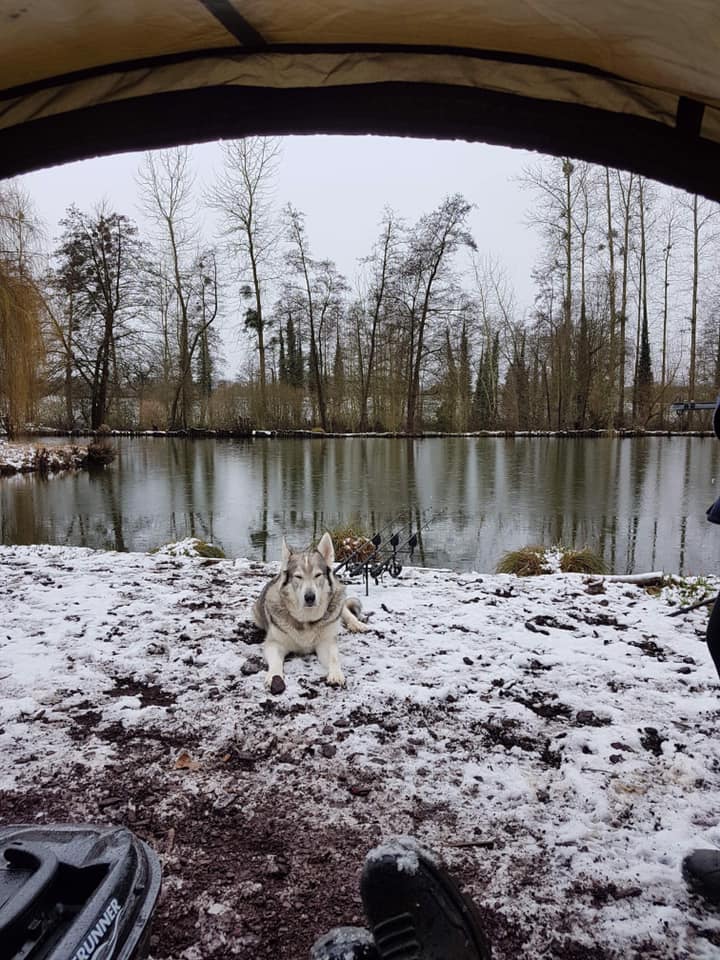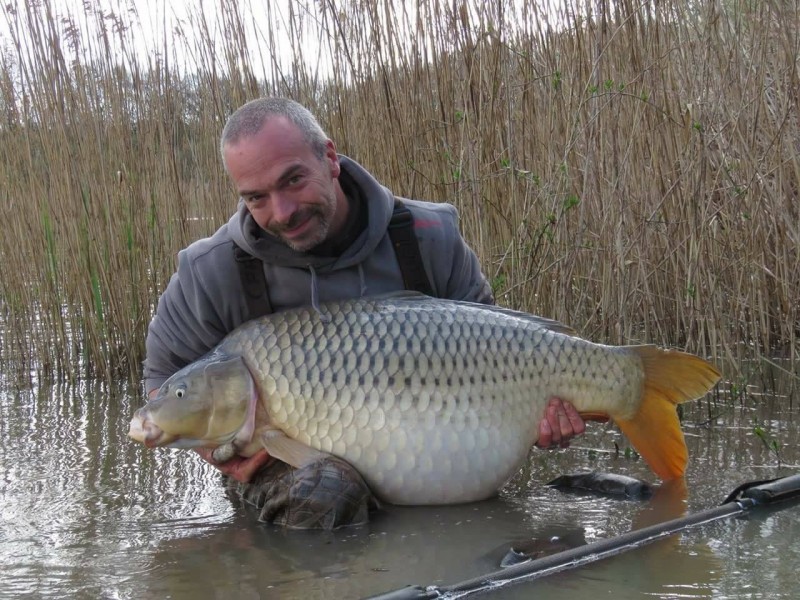Ten top tips to make your next winter French carp fishing holiday your most comfortable – maybe even productive – yet…
I can well remember my first carp fishing overnighter. Ill-equipped does not begin to cover it. And here’s the thing: it was in spring.
The days were sunny – almost balmy. The nights, as it transpired… not so much! In fact, the temperatures plummeted.
With the result that, if I remember correctly, at one stage I actually began to hallucinate from within the inadequate folds of my Woollies bag and Argos brolly.
How things have changed.

Nowadays we as anglers have enough all-seasons gear at our disposal to make Ranulph Fiennes blush.
So, follow these time-honoured principles on your winter French trip, and you’ll enjoy all the comforts of home (well, almost); and maybe a carp or two to boot.
1/ Compact and bijou wins the day
Smaller bivvies are far easier to heat, and to keep warm, than their bigger brethren. So choose a tent that affords you sufficient space, and no more.
Avoid the monster – head-height, four-person – affairs that are fast gaining popularity. And if you must take the kitchen sink, take a kitchen tent to go with it.
Your house should be well ventilated too, and ideally equipped with a winter skin – reducing the risk of condensation.
2/ A bag for all (five) seasons
Any sleeping bag that’s purpose-designed for anglers will necessitate a compromise – either in terms of warmth, accessibility, or portability (physical size and weight).
Smaller, mummy style bags warm up more quickly, and stay warm longer – especially if they’re zipped up tight. But they’re a luxury that anglers can ill-afford.
Either in hope or expectation, we have to allow for a quick and easy ‘early-hours’ exit, to hit those all-too-rare winter runs. Which means we need far greater manoeuvrability – crash zips and the like – to ensure we don’t break our necks as we lunge, dazed and bleary-eyed, at our rods.
The message then is simply: choose the best bag you can afford. Preferably a Five Seasons version.
Setting aside the fact that the tackle co.s have apparently introduced a new equinox into the almanac, I can unconditionally recommend the Gardner Carp Duvet, which – having a removeable inner layer – can be used in both summer and winter.
The addition of a bag cover is also recommended, potentially adding another 10-15 degrees of warmth.
3/ Exercise before bed (yes, really)
Don’t go to bed cold. Sleeping bags are hard to warm up if your body temperature is already low. So take a stroll to warm up before turning in.
And however brisk it may be, resist the temptation to pull the bag over your head: breathing creates condensation which can result in a damp bag.
Rather, wear a hat in bed, to help retain body heat.
4/ Check the forecast
Check the forecast for your venue, and your route, right up until the last minute. The weather, as we know, is unpredictable.
Low lying areas flood; higher ground can become impassable through snow; and temperatures can crash overnight.
Thankfully it’s easy to check the local forecast, with the Met Office, AccuWeather and the BBC offering up to the minute (if occasionally contradictory!) forecasts, Europewide.
5/ Your phone is your lifeline – keep it charged
When batteries get cold, their performance suffers, draining way faster than usual.
So if your vehicle isn’t parked close to your peg, take an emergency power pack or solar charger; or even – if funds permit – a BioLite stove which, in addition to adding a whole new dimension to your bankside cuisine, can also be used to charge your phone.
6/ Clothes make the (wo)man
The key to keeping warm in winter is layering: regulating your temperature with multiple layers rather than a single ‘heavy-duty’ layer that may become too warm or won’t breathe (causing you to sweat, then cool).
So, add layers when you are cold, then take them off when you’re hot.
7/ Feet first
Cold feet can mar any cold-water carping trip. So choose the best boots you can. And – take it from me – you should always carry a spare pair.
If you take a dunking, you’ll quickly regret not having something dry to slip into.
Been there, done that.
Like sleeping bags, boots are often categorised into seasons, with 4 season – aka Alpine – boots being designed for the harshest conditions.
Whatever type you go for, they must be waterproof and insulated against the cold.
The layering principle can also be applied to your socks: use a thin pair as a base layer, with a thicker pair on top to add comfort and warmth.
8/ Gas, gas, gas
Gas behaves differently when it’s cold. Propane will turn to liquid at a lower temperature than butane (meaning it’ll remain useable when it’s colder).
My vote however has to go to the liquid fuel Coleman which just keeps on going, whatever the weather.
Consider also going old school with the help of a Kelly Kettle; which if nothing else will make you feel (if not fish) like Chris Yates!

9/ Ditch the diet
Eating right is key to staying warm.
Breakfast should be packed full of calories to keep you going till lunchtime. Porridge, nuts and eggs are all great. Cheese, dark chocolate and dried fruit are also good for snacking.
For dinner, choose something rich in complex carbohydrates such as for example wholegrain pasta.
Foods rich in fat calories will help you stay warm throughout the night.
You should also drink plenty of fluids during the day, too. It’s easy to become dehydrated due to the lack of humidity in the air.
So you’ll need to replace the water you lose through respiration and evaporation.
10 / Stay off the sauce (sorry!)
A tot of the good stuff may give you a warm glow; but it’s not advised.
Drinking alcohol lowers the core temperature of your body. And it doesn’t take that much for this effect to kick in: just one cheeky beer – or glass of wine – can start the process.
The science: When you have a drink, the volume of blood brought to the skin’s surface increases, making you feel warm. (It’s the reason intoxicated folk often look flushed.)
But that blood will cool rapidly, due to the chill in the air.
Blood rushing to the skin can also make you sweat, decreasing core temperature even further.
Drinking alcohol also reduces your tendency to shiver – something your body does naturally when needed, to generate heat.
The lesson, then, is clear: you may be in France. But leave the vino at home.
Bonus Tip #11: Choose a venue with accommodation!
Well, hey: angling is supposed to be fun after all. And this way you’re pretty well guaranteed to stay warm throughout the darkest watches of a winter night.
You’ll find more than 20 prolific French carp fishing venues with accommodation right here.
Steve Calder


Comments